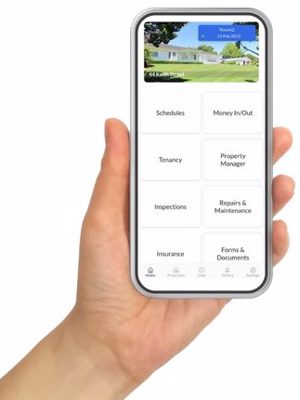Meet your next property manager:
7 reasons why an app is the way to go for your rental
Have you been searching for a property manager that checks all the boxes and doesn’t leave you with a teeny-tiny profit on your rental?
In this guide, we’ll dive into why an app – aka software – will make your life easier…and your profits juicer.

The 4 Ways to Managing Your Own Rental Investment Property
Whether you have one or several rentals, it comes down to four main options, these are:
- Self-manage
- Property Manager
- Self-manage with a rental property management app/software
- Hybrid approach
Let’s take a closer look at these options and cover some of the decisions you will need to make. We’ve done this as a shootout so you can see our thinking and these options’ strengths and weaknesses. The main sections we are going to cover in this blog are:
- Costs of each option – we’ll take you through the numbers for some scenarios
- Landlord factor – when you should self-manage and when you shouldn’t
- Property factor – some properties suit different management approaches
- Tenant factor – short-term and long-term tenants suit different management methods
- Hybrid approach – yes, there are some mix-and-match options that suit some
- Processes and workflows – These can make a big impact on how smoothly things go
- Set-up, simplicity and convenience – Whatever the solution, it needs to be easy to use
Let’s take a look at the four main options for managing rental properties.
Self-manage on your own
Many landlords manage their rentals like they manage their own homes: using an assortment of calendars, spreadsheets and post-it notes. This approach often works ok…until it doesn’t!
At first glance, the cost of this approach is the lowest of all the options, but…is it so? More on that later.
Property Manager
Property management companies are at the other end of the continuum; they cost the most but are also very focused on monitoring and managing your rental properties. They are almost a set-and-forget solution… but you will pay for that.
Self-manage with property management software
Using the power of cloud-based software and an App to manage your rental property can often be an ideal middle ground between the ad hoc self-manage approach and the full-service property management companies. The software still requires someone to use it. It is not a set-and-forget option. Most property management companies will have some form of software solution to manage properties.
Hybrid approach
The three options above can also be used together as part of an overall solution.
For example, if you have multiple real estate properties, you could self-manage some and use a property manager for others. Alternatively, some property managers will give you access to the online software they use. In reality, most rentals will need to utilise some form of app to ensure compliance and effectiveness.
Other hybrid options involve landlords self-managing with or without software while also using third-party providers for things like finding new tenants or specifically focusing on repairs and maintenance.
1. Costs of property management software vs. a property manager
When you engage a company, you are handing over the administration of most tasks related to managing your rental property and its tenants.
If you decide to self-manage your rental property, you keep full control but need to do the work, although you can be paid well for this work – more on this shortly.
How much does a property manager cost?
The rates for a property manager in Australia or New Zealand are fairly similar, with typical rates starting at 6% and going up to 10% or more.
There are invariably other fees added on top for things like the leasing fee, the lease renewal fee, inspection fees, financial statements, marketing charges, etc. To get an all-inclusive fee, you may be looking at 14% or even 18% – which is getting up there! A word of caution: always double-check what is not included in these “all-inclusive” fees 🙂
Here’s a long list of possible costs that are often added on top of the standard percentage that a property management company charges. For some companies, their 10% fee covers all these extra costs. As a rental property owner, you should always seek to clarify if there are any hidden costs or fees.
-
-
- Letting or Tenanting Fee
- rental appraisals
- disbursement fee
- Repairs, maintenance, and inventory fees
- Administrative fees
- maintenance premium on invoices
- charge for regular inspections (including video inspections)
- property monthly/annual reports and financial statements
- credit and tenancy database checks
- annual fee
- holding fees
- fee for tenancy renewals
- maintenance bond
- mileage fees
- Fee for rent increase
- non-business hours work fee
- rental property sale fee
- professional photography fee
- charges for Tribunal/Court Attendance
- insurance claim processing fee
-

Should I pay myself to self-manage my rental property?
Here’s a simple but very informative approach that you can use to work out what you are effectively paying for managing your rental. In this approach, we contrast what a rental property management company would charge with what it would cost if you paid yourself to do it.
What would a rental property management company cost you?
Start by working out your estimated total rent for the year. If your weekly rent is $550, your total rent for the year would be 52 x $550 = $28,600.
Now work out the rental property management fees. Simply multiply the total rent by 9% or whatever management fee you think is appropriate:
This would be 0.09 x 28,600 = $2,574
- Treat this number as the ‘base cost’ because the property manager may pass on many other costs as the year progresses.
- Keep in mind that some of these extra costs would apply even if you were a self-managing landlord. Also, remember that this is only the cost of managing your rental – it is not the cost of fully running your rental property. It excludes interest, water rates, repairs and maintenance, insurance and rates etc.
Now comes the interesting part, where we compare the cost of a property manager with self-managing the rental property – yourself.
Cost comparison: self-managing vs. hiring a property manager
To do this, divide the annual property manager fee above ($2,574) by what you are being paid for your current job – if you have one. For example, if you are on a salary of $75,000, your hourly rate for approx 2080 hours per year would be $36/hr. This gives you a rough idea of what your time is worth workwise. For example, you could explore the idea of going down to part-time and then using some of that time for rental property management. Let’s explore this concept a little more.
How many hours per month do you think a property manager would spend managing your rental property? This would be for collecting rent, doing quarterly inspections and managing any repairs and maintenance. Occasionally, it would also involve meeting with tenants and resolving issues such as unpaid rent or other obligations not being met.
If you thought these activities would take a property manager 3 hours per month, then the costs of you doing it at $36/hour would be $144/mth compared to the rental property management company cost of $214.
You can adjust the hours up or down depending on what you think would be suitable for your tenants and rental properties. You can set these figures differently for each of your properties as some will be easier to manage than others.
Keep in mind that it is fairly likely that the property manager may have more experience managing rental properties than you. This may mean that, in some cases, they will be able to manage the property more efficiently and/or effectively than you. However, remember that you are likely to be more motivated and focused on what is best for your property, your tenants…and your wallet!
Should I pay myself to self-manage my rental property?
Here’s a simple but very informative approach that you can use to work out what you are effectively paying for managing your rental. In this approach, we contrast what a rental property management company would charge with what it would cost if you paid yourself to do it.
What would a rental property management company cost you?
Start by working out your estimated total rent for the year. If your weekly rent is $550, your total rent for the year would be 52 x $550 = $28,600.
Now work out the rental property management fees. Simply multiply the total rent by 9% or whatever management fee you think is appropriate:
This would be 0.09 x 28,600 = $2,574

Should I pay myself to self-manage my rental property?
Here’s a simple but very informative approach that you can use to work out what you are effectively paying for managing your rental. In this approach, we contrast what a rental property management company would charge with what it would cost if you paid yourself to do it.
What would a rental property management company cost you?
Start by working out your estimated total rent for the year. If your weekly rent is $550, your total rent for the year would be 52 x $550 = $28,600.
Now work out the rental property management fees. Simply multiply the total rent by 9% or whatever management fee you think is appropriate:
This would be 0.09 x 28,600 = $2,574
- Treat this number as the ‘base cost’ because the property manager may pass on many other costs as the year progresses.
- Keep in mind that some of these extra costs would apply even if you were a self-managing landlord. Also, remember that this is only the cost of managing your rental – it is not the cost of fully running your rental property. It excludes interest, water rates, repairs and maintenance, insurance and rates etc.
Now comes the interesting part, where we compare the cost of a property manager with self-managing the rental property – yourself.
Cost comparison: self-managing vs. hiring a property manager
To do this, divide the annual property manager fee above ($2,574) by what you are being paid for your current job – if you have one. For example, if you are on a salary of $75,000, your hourly rate for approx 2080 hours per year would be $36/hr. This gives you a rough idea of what your time is worth workwise. For example, you could explore the idea of going down to part-time and then using some of that time for rental property management. Let’s explore this concept a little more.
How many hours per month do you think a property manager would spend managing your rental property? This would be for collecting rent, doing quarterly inspections and managing any repairs and maintenance. Occasionally, it would also involve meeting with tenants and resolving issues such as unpaid rent or other obligations not being met.
If you thought these activities would take a property manager 3 hours per month, then the costs of you doing it at $36/hour would be $144/mth compared to the rental property management company cost of $214.
You can adjust the hours up or down depending on what you think would be suitable for your tenants and rental properties. You can set these figures differently for each of your properties as some will be easier to manage than others.
Keep in mind that it is fairly likely that the property manager may have more experience managing rental properties than you. This may mean that, in some cases, they will be able to manage the property more efficiently and/or effectively than you. However, remember that you are likely to be more motivated and focused on what is best for your property, your tenants…and your wallet!
Multiple Properties
To get the full picture you need to add the costs for all the rental properties you own. You will likely find that the hours required per property reduces as you will efficiently replicate many tasks across all properties at the same time. Some property management companies may provide a discount for multiple properties – make sure you check!
Using the numbers above, you would be spending 3 x $2,754 = $7,722 per year for 3 properties.
Based on your hourly rate of $36, this would mean you or your spouse could consider going semi-part-time at work… from 40 hours down to 35 hours per week… and still, be better off.
What is the cost of property management software?
There are a few property software management platforms available but let’s use the Your Home Our Home platform as an example to work things out. We will work on a scenario where you have three rental properties; we will use the same numbers as above for the comparison.
Most property management software solutions are priced at a monthly cost per property. For example, Your Home Our Home has two different payment plans, one is $6 per property per month and the other is $9 per property per month (properties above 10 are free).
The total cost per year for rental property management software for three properties would be $216 or $324, depending on your plan. This can be compared with the property management company, which would cost $7,722. Ok – I know this is not a fair comparison as the software still needs someone to use it and manage the property, let’s drill down a little deeper.
How rental property management software can help
Let’s work out the payback of this software for two scenarios. The first scenario will compare the software cost for landlords that already self-manage their properties. In the second scenario, we will compare the cost for a landlord that wants to replace their current property manager with rental property management software.

Scenario 1 – Self-manage without software vs. self-manage with rental software
In the numbers above we used an estimate of 4 hours per month to manage each rental property; for our three properties, this would be approximately 12 hours at $36/hr. Let’s assume that the rental property management software enabled us to reduce the number of hours from 4 per property per month down to 3 hours per month.
- No rental property management software: The cost is $0
- With rental property management software: $216 or $324 per year
Without good software, there may be hidden costs arising from having less automated and formal systems such as overlooked items, neglected compliance requirements, penalty charges for late payments etc.
Scenario 2 – Self-manage with software without the need for a property manager
Using the numbers above the cost for a property manager for three properties would be $7,722. If we removed this cost and then added the software cost of $216-$324 and also paid yourself for the time to manage the properties at the slightly reduced time requirement of 3 hours per property per month.
- Stopping the rental property management company would reduce costs by $7,722
- Purchasing the software subscription would add $216-$324 to the cost
Get a free overseas holiday every year
Why not pay yourself for self-managing your own rental property. If you used rental property management software to help manage your rental properties rather than a property manager, the savings would be around $3,510.
This is based on:
- $7,722 the cost of the property manager
- – $324 less the cost of the software
- – $3,888 less the cost of paying yourself to self-manage, i.e., 3 properties x 3hrs/property x $36 = $3,888
- $3,510 This is what is left for your overseas holiday.
Download the property management calculator here for free
Shootout – self-managing wins
In this category, self-managing your own rental property is the lowest cost. There may be downsides to this if you do not have adequate systems in place. Self-managing with the use of rental property management software comes second. A full-service property manager is the most expensive but may have other benefits of reduced hassles, especially if you’d rather not self-manage.
2. The Landlord Factor
One of the biggest questions facing landlords is whether to self-manage their rental properties or use a property manager. There is, however, a middle ground that is often overlooked:
To self-manage using rental property management software
There is no one correct option as it significantly depends on the 'Landlord Factor'. Let's take a look at this in more detail.
A Landlord should self-manage with rental property management software when:
- They have the time to self-manage their own rental properties.
- They have the skills or are willing to learn as they go on how to manage their rental properties.
- They have the personality to work constructively and fairly with tenants.
- They want to maximise returns.
- They have rental property management software or equivalent self-designed systems.

A Landlord should use a property manager when:
- They want to take a hands-off approach to managing their rental property.
- They are willing to forgo maximum returns in order to have someone else do it for them.
- They do not have the skills or inclination to self-manage their own properties.
- They do not have the time or are too far away to easily manage their rental properties.
- They want to be able to hold another entity responsible (or partially responsible) for the risk and hassles associated with rental property management.
The impact of landlord personality
Is a property manager the ideal solution for you?
- Do you get highly frustrated when tenants do not care for a property with as much care as you would?
- Do you get stressed when having to be firm and formal when dealing with tenants that are not meeting their obligations?
- Do the skills and knowledge required to manage rentals and tenants scare you?
- Do you dislike the need to have to manage your rental property in addition to having a normal day-job?
If you answered ‘yes’ to one or more of the above questions then a property manager may be the ideal solution for you.
Is self-managing your rental with rental property management software the ideal solution for you?
- Do you value the role of the landlord and their ability to work constructively with tenants?
- Do you like learning new skills and researching solutions to property and tenant-related issues?
- Do you like using software systems on your mobile or on the web?
- Do you dislike paying someone to manage a rental when you think you can and should do it yourself?
- Do you like doing DIY work or organising work (repairs and maintenance) to be done on your rental properties?
If you answered ‘yes’ to one or more of the above questions, you may be an ideal self-managing landlord.
Spouses and Partners
Many families have a primary caregiver and a secondary caregiver, in a similar way they have a primary income earner and a secondary income earner. Unless you have a very large property portfolio, the role of managing your properties could likely be done in a few hours per week. This may be a very attractive option, especially with increasing costs such as mortgage interest rates. Couples should ask themselves:
- Can one of us take on the role of property manager?
- How much would we save if we self-managed?
- Which one of us has the best skillset and temperament to manage our properties?
- If so, who should it be, and what do they need to assist them in this… maybe it just needs some rental property management software?
Shoutout – it’s a draw.
Due to the highly personalised aspects of this area, we cannot assign a clear winner.
3. The Property Factor
What type of property do you own?
- Is your property in good condition and would need minimal repairs and maintenance to be done?
- Is your property getting older and needing lots of TLC to keep it running smoothly?
- Do you like choosing contractors and making the arrangements to get work done?
Repairs and upkeep require a lot of time to ensure things go smoothly and that all parties are kept happy, including the contractors, the tenants, you and also the property manager if you are using one.
Many property management companies will add a surcharge on repairs and maintenance costs. These surcharge costs can quickly add up for properties when the R&M tasks are major.
Some of the best property management software out there have special features to streamline the entire process from inviting contractors, seeking quotes and estimates for work, screening and selecting quotes, and keeping track of work notes and job completion notes.
Shootout – the rental property management software wins
The additional costs imposed for repairs and maintenance by property management companies are often high and not included in the normal property management fees. While property managers will do most of the organising, they will likely need to get your sign-off for non-trivial repairs and maintenance.
4. The Tenant Factor
Excluding a few landlords from hell… anecdotal evidence tends to indicate that tenants prefer dealing directly with the landlord rather than going through a property management company. On the surface, this seems to be a win for self-managing landlords, although it can be a symptom of the landlord being too ‘soft’ or maybe even a symptom of the property manager being too ‘hard’.
Generally, property management companies will do more inspections than self-managing landlords. They will often follow up on tenant non-performance and non-payment issues quicker than self-managing landlords. Moreover, companies usually have strict KPIs on when things should happen.
For longer-term tenancies, the landlord and tenant will often develop a positive and constructive relationship of respect and responsibility.
For longer-term tenancies that are being self-managed, the landlord and tenant will often develop a positive and constructive relationship of respect and responsibility.
These types of tenant/landlord relationships can have positive benefits for both parties. Tenants will often look after the property better and be willing to contribute more to the upkeep of the property. Landlords will be less aggressive in their rent increases and more open to giving tenants more flexibility, e.g. allowing pets.
Shootout – property management wins (short-term tenants).
Diligent follow-up by the property management company can be highly advantageous.
Shootout – rental property management software wins (long-term tenants).
The costs of property management for long-term tenants are harder to justify.
5. The Hybrid Approach
Managing your rental does not need to be an either or approach. For example, you can self-manage your property using a rental property management software such as ‘Your Home Our Home‘. You can then use specialist solutions for finding tenants, such as TradeMe, OneRoof and others.
Another option is to use a property manager for some properties and self-manage the others using a software solution.
When selecting a software platform, we recommend you find one that will enable landlords, property managers, contractors and tenants to use the same program/App. Your Home Our Home is one such product.
Shootout – too hard to call here

6. Processes and Workflows
Generally speaking, the service provided by property management companies is meant to make the whole concept of owning a rental property easier and more streamlined.
Property Managers are good with standard tasks such as inspections, rent collection, guidance on regulatory requirements etc. However, anything that is not standard such as non-trivial repairs and maintenance, can add a lot of complexity.
Repairs and maintenance can become complex
When you self-manage a rental, you can make big decisions quickly and easily. There are no back-and-forth discussions with property managers asking what you want to do and then getting your approval on the path forward. When you self-manage, you can check what is needed, source your contractors, and make it happen.
Simple things like pets
If you have long-term tenants that have been with you for a few years, you will often be willing to make a few concessions.
Maybe you let them have pets that were otherwise not permitted, or allow them to paint their child’s room a colour they like. These concessions can become unnecessarily complex when a property manager is involved – new tenancy contracts may need to be developed, or other red tape might get in the way for all parties.
Good software makes changes easy
A good app will make these processes easy for self-managing landlords to make changes, manage repairs and maintenance, and carry out these non-standard areas quickly and easily.
Good software will also enable you to track exactly what is happening and keep track of any changes.
Shootout – rental property management software wins
While property managers will often use software to manage their rentals and to liaise with owners, the major drawback is the fact that there is one additional middleman/person between the tenant and the owner.
7. Set-up, simplicity and convenience
The process to appoint a property manager to manage your rental will often be made as efficient as possible but will take time and will involve a certain amount of form filling. The process to sign-up for rental property management software will often be easy and involve minimal time.
Both approaches will require some set-up to add properties and tenancies etc.
The software will be always available and easy to use when and where needed. Most property managers work on a combination of email, phone and text messaging, with some even providing a 24hr service.
Shootout – rental property management software wins
Both processes are fairly streamlined, but the ongoing convenience and always-available nature of the rental property management software takes a slight lead here.
Final Verdict
The final verdict is far less important than the discussion that occurs within each of the sections covered above. All landlords are different, all property managers are different and all software solutions are different. The goal of this article has been to cover the main parameters that should be considered when choosing the best way to manage your properties.
Finding a good property manager is just as important as finding good rental property management software, it is worthwhile carefully investigating the different options. In the case of software – there will often be the option to try the software before committing to an ongoing subscription.
If you have questions about using software to manage your rentals, and want to find out if this is the best option for you, visit our FAQ section or get in touch with us! If you are ready to go, simply sign up here.

